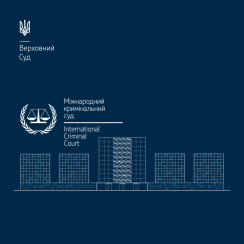Contact center of the Ukrainian Judiciary 044 207-35-46

Justices of the Supreme Court and judges from appellate and trial courts of Ukraine visited the Hague (Netherlands) from July 3rd through July 9th, where they had several meetings with judges of the International Criminal Court (ICC), other international tribunals, Supreme Court of Netherlands, District Court and Appellate Court of the Hague as well as with prosecutors and attorneys experienced with international tribunal proceedings.
More specifically, Ukrainian judges visited the International Criminal Court where they met with ICC President Piotr Hofmański as well as with judges, prosecutors, and other ICC representatives. The participants discussed the ICC case law, the importance of ensuring fair and efficient adjudication of war crime cases. Considering Ukraine's recognition of the ICC's jurisdiction, it is important to establish the cooperation between ICC and Ukrainian law enforcement and judicial authorities and to apply the international humanitarian law in war crime trials at the national level.
Members of the Ukrainian delegation had a meeting with Iain Bonomy who served as a judge of the International Criminal Tribunal for former Yugoslavia (ICTY) between 2004 and 2009 and currently is a judge at the International Residual Mechanism for International Courts. Mr. Bonomy shared his experiences and lessons learned from activities of the mentioned above international judicial institutions.
Ukrainian judges visited the Supreme Court of Netherlands and District Court and Appellate Court of the Hague, where they learned about the case law of these institutions and specific aspects of adjudication of war crime cases, trials in absentia, protection of victims' rights, etc.
Another meeting was with the Special Tribunal for Lebanon Prosecutor Norman Farrell, who exposed the Ukrainian judges to this tribunal's experience in carrying out criminal proceedings in absentia. This experience is unique as other international or special tribunals never have used such a procedure.
Besides, Ukrainian judges familiarized themselves with the experience of the State Court of Bosnia and Herzegovina War Crimes Section, including issues related to the domestic adjudication of cases related to genocide, crimes against humanity, and war crimes.
Special attention was paid to such issues as the applicability of international tribunals' case law by Ukrainian national courts; the meaning of "other violations of rules and customs of law"; a need for psychological support of witnesses and victims of war crimes; specifics of trials in absentia including the issue of proper notification of proceedings participants about hearings; interrogation of war crimes victims and witnesses by an investigative judge at the pre-trial stage; use of digital evidence; and other burning issues.
Based on the outcomes of the study visit to the Hague, recommendations on enhancing the process of adjudicating war crime cases in Ukraine will be developed.
The study visit was organized with the support of the USAID Justice for All Activity.